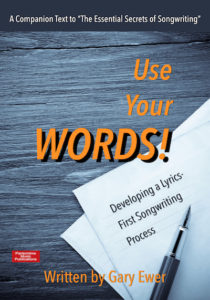It’s a dangerous can of worms to open if you dare ask someone, “What is good music?” Most of the time, people misunderstand the question and think you’re really asking, “What are your favourite songs?”, or perhaps “What is your favourite style (genre) of music?”
There is an important difference between “What is good music?” (or “What is a good song?”) and “What are your favourite songs?” If you consider yourself to be a student of songwriting, even if informally, you need to know the difference between those two questions.
 “Use Your Words! Developing a Lyrics-First Songwriting Process” is a FREE add-on when you purchase “The Essential Secrets of Songwriting 10-eBook Bundle. Eleven songwriting eBooks for only $37!
“Use Your Words! Developing a Lyrics-First Songwriting Process” is a FREE add-on when you purchase “The Essential Secrets of Songwriting 10-eBook Bundle. Eleven songwriting eBooks for only $37!
Bob Dylan has used a wonderful analogy for describing a good song, which is that it should be able to “walk by itself.” A good song has life. It has an identity, and it exists long after someone sings it.
To describe more fully what I mean by that, try to imagine the world before anyone had ever heard “Tutti Frutti”, “She Loves You”, or “Billie Jean.” Those songs quickly gained a life of their own. They now walk by themselves, as Dylan would say.
Why do we need to know the difference between good songs and favourite songs anyway? It comes down to recognizing that some songs are excellent even if they don’t happen to excite us personally.
As a songwriter, you need to be able to listen to and understand songs — why they work, why they succeed, and determine what you can learn from them — as an issue quite apart from whether or not you happen to like them.
To be able to listen to songs with that more objective viewpoint means being able to listen to, let’s say, a country song and recognize its excellence, even if on a personal level you happen to rather dislike country as a genre.
Objective listening means being impartial. It allows you to appreciate the excellence of a particular folk song, for example, even if it’s not a song you’d willingly otherwise listen to.
It’s tricky, of course, to recognize greatness in a song that you just don’t like. In fact, some might argue that it’s practically impossible to judge music on those kinds of objective terms.
But if you want to improve your songwriting abilities, objective listening is crucial. To practice and improve your skills with regard to this all-important notion of impartial listening, try the following:
- Choose a genre that isn’t normally one you like.
- Do some online research and find songs that have been top of the charts, proving themselves to be strongly influential for other songwriters in that genre.
- Listen to the song, and keep your personal judgements at bay.
- Try to imagine what someone who loves the song is hearing when they listen to it.
- Make mental (or actual) notes about what you as a songwriter can learn from these songs.
That final point is probably the most important one. Because if you’re not trying to actually learn from these songs, the exercise is pointless from a songwriting point of view.
You’ll find that if you can incorporate some ideas into your own music, you’ve done something important: you’ve (in a sense) created a new genre which is a mélange of whatever you used to write, mixed in with what you’ve learned by listening to other new-to-you songs.
That’s when your own songwriting can take an enormous step forward!
 Written by Gary Ewer. Follow Gary on Twitter.
Written by Gary Ewer. Follow Gary on Twitter.
 “The Essential Secrets of Songwriting” 10- eBook bundle comes with a free copy of “Use Your Words! Developing a Lyrics-First Songwriting Process.” Discover the power and excitement that comes from putting your lyrics front and centre in the songwriting process.
“The Essential Secrets of Songwriting” 10- eBook bundle comes with a free copy of “Use Your Words! Developing a Lyrics-First Songwriting Process.” Discover the power and excitement that comes from putting your lyrics front and centre in the songwriting process.











Pingback: In songwriter-mode | Two Doors Down